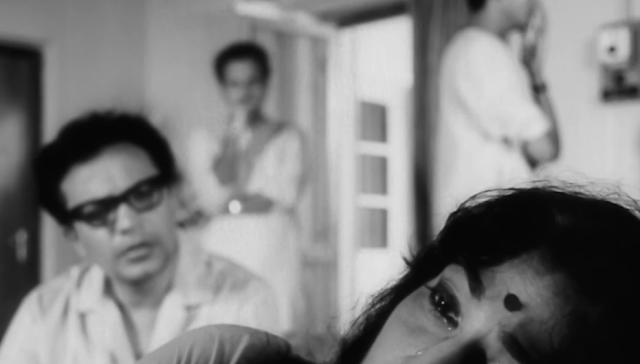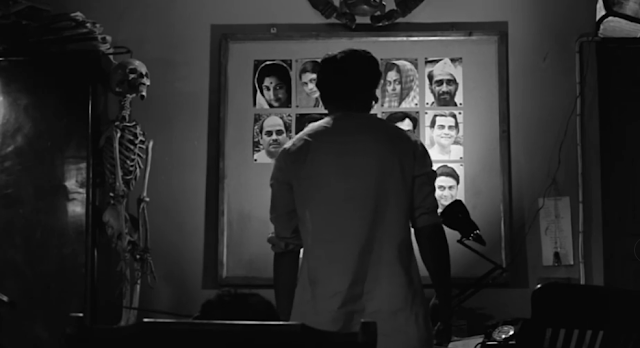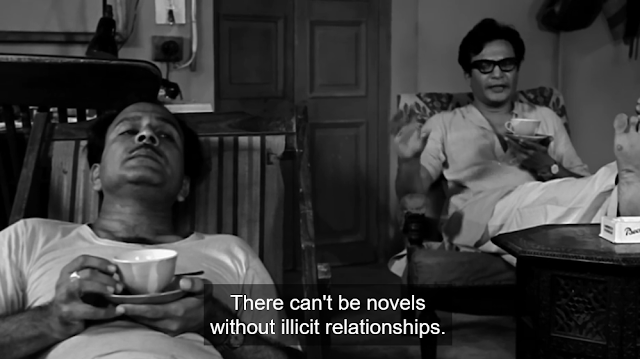The Bollywood movies of the Nineties could get pretty wild, but Basant (1960) is a product of a different time, an age in which Shammi Kapoor and company could make sweet, uncomplicated romances that stick to a single genre throughout. Nah, I'm just kidding - it gets pretty wild before the end.
Meenakshi (Nutan) is in love, but her stuffy, rich father Rai Bahadur (Murad) just doesn't understand, and he takes her to Calcutta by train in order to get her away from her paramour. They argue, which mostly consists of them saying "My foot!" to each other at every conceivable opportunity. During the night, Meenakshi sneaks away, hoping to catch a train to Bombay so that she can finally be with the man she loves, Rajesh (Pran).
If you know your Bollywood supporting actors, you know what a bad idea this is. Pran had a long and varied career in which he played many different roles, but back in 1960 he was pretty firmly typecast as "Apparently rich jerk who needs money and has a thin mustache that makes him look like Evil Walt Disney." Rai Bahadur is absolutely right to be concerned, though dragging your daughter to Calcutta is perhaps not the best way to handle the situation.
Before Meenakshi can get another train, her suitcase is stolen by Billoo (Johnny Walker), a surprisingly persistent petty thief. She chases him to the circus, where she recovers her bag, discovers that her father has all the local police out searching for her, and performs a quick dance number onstage with out of work writer turned circus performer Ashim (Shammi Kapoor) in order to escape.
When she gets back to the train station, it's crawling with police. She takes a bus, and winds up getting robbed again by Billoo. Then the bus is boarded by police, and she's saved by Ashim, who pretends to be her overly possessive husband until the policeman leaves out of embarrassment.
And then it's road trip time! They're both on the way to Bombay, and Ashim keeps helping Meenakshi, in part because he's just a decent guy who can't stand to leave someone in trouble, and in part because he thinks he can get a good story out of the adventure. There are mishaps, they are pursued by Billoo, who wants the substantial reward Rai Bahadur is offering, and there's a great deal of bickering and "My foot!"s, but they also get to know one another a bit more, and we learn that Meenakshi is not so much spoiled as incredibly sheltered; Rajesh is pretty much the first man she's met outside of her father's supervision, and she's really more interested in freedom than suave, sinister mustaches.
And speaking of suave, sinister mustaches, Rai Bahadur is so desperate to find his daughter that he contacts Rajesh and tells him that he'll agree to the marriage, as long as Meenakshi comes home safely. This suits Rajesh nicely, and he makes plans for the wedding, though he doesn't put any effort into finding his fiance.
By this point, Meenakshi and Ashim have inevitably fallen in love, though Ashim hasn't quite figured that fact out, even after Meenakshi asks him to take her home, rather than keep going to Rajesh's place. It's only when they reach her front gate that she manages to explain the situation to him, using small words and a power point presentation. They are in love! It all sounds like a very sincere take on an old-school screwball comedy. Actually, it sounds like a very sincere take on a specific screwball comedy, It Happened One Night, mostly because that's where they lifted most of the plot from. But this is Bollywood, and there are always other genres to explore. Time for a twist.
Ashim suggests that the spend a month apart, without contacting one another, in order to make sure that it's really love and not just infatuation brought on by an adventure in close proximity. He has a point, given how she started her relationship with Rajesh, so they go their separate ways, promising to meet up again in a month. What could go wrong?
Plenty. At Meenaskhi's birthday party, Rai Bahadur announces her engagement to Rajesh. Ashim is there in disguise (naughty Ashim), and immediately jumps to all the wrong conclusions. They fight, they make up, they resume their separation, and the genres start flying fast and furious.
It's an adventure movie, as Ashim accepts a job to take a valuable necklace to a village in rural Assam, only to be robbed and apparently killed by Rajesh's men. It's a melodrama, as Meenakshi crashes her car while speeding to the planned meeting with Ashim, only to end up in a wheelchair, her father dead of shock, and forced to depend on Rajesh and his passive aggressive protestations of disinterested love. Then it becomes a Western? Sure, why not? Strict genre boundaries are a prison, and movies want to be free.
When Basant is a screwball comedy, it's pretty adorable. Of course, it's lifted pretty directly from It Happened One Night, but when you steal you should steal from the best. Shammi and Nutan have a relaxed and easy chemistry, and their escapades are fun rather than stressful. It gives them plenty of time for character development, and that character development carries over into the chaotic second act, while Billoo transforms from annoying comic nemesis to annoying but genuinely useful sidekick. It's still a chaotic mess, but it's a chaotic mess with heart.
.png)
.png)
.png)
.png)
.png)
.png)





























